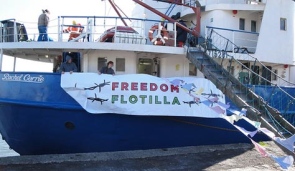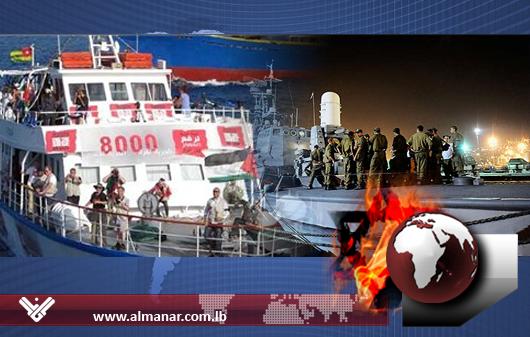"Together, we call for the world to be a better place and justice for all, rights for all"
 The organizers of a new Gaza flotilla on Tuesday vowed to carry out their plan to break an Israeli naval blockade and deliver aid to the Gaza Strip, in what an Israeli official warned would be a "political provocation."
The organizers of a new Gaza flotilla on Tuesday vowed to carry out their plan to break an Israeli naval blockade and deliver aid to the Gaza Strip, in what an Israeli official warned would be a "political provocation."
The flotilla is expected to reach the waters off Gaza in the third week of June, Greek organizer Vangelis Pissias said at a press conference hosted by European Union parliamentarians in Strasbourg.
The attempt would come one year after Israeli commandos boarded a similar flotilla on the high seas and clashed with those aboard the main Turkish ship, resulting in the martyrdom of nine Turkish activists.
Several EU lawmakers have pledged to take part in the new flotilla, with organizers saying that their status will help protect others on board.
The ships will carry school materials, medical equipment and possibly construction equipment for Gaza citizens, according to organizer Manuel Tapial. "Civil society has a responsibility, a responsibility when the political class is hesitant," the Spanish activist said. "I feel that this is the case here."
"This will go beyond tangible humanitarian assistance ... Together, we call for the world to be a better place and justice for all, rights for all," a third organizer, Claude Leostic of France, added, arguing that the Israeli blockade on Gaza is illegal.
But Israel's ambassador to the EU, Ran Curiel, insisted in a separate press conference in Strasbourg that his country is well within its rights, noting that it had intercepted a German-owned cargo ship carrying weapons for Palestinian militants in March.
He also called on the flotilla organizers to bring their materials to Gaza through approved land-based routes.
"In our view, the flotilla is clearly a political provocation, ... since there's no need for a flotilla to aid Gaza," Curiel said. "You can pass whatever you want to Gaza through normal channels."
When asked if he thought that flotilla participants would be putting their lives at risk, he first replied with a simple "no." "I cannot refer hypothetically to what response of Israel will be," he later added.
